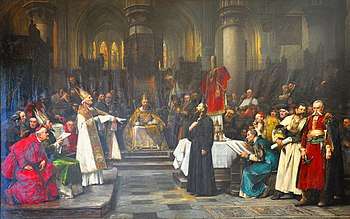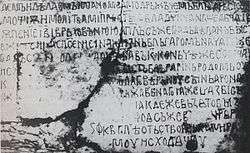Nationalism in the Middle Ages
Theories on the existence of nationalism in the Middle Ages may belong to the general paradigms of ethnosymbolism and primordialism or perennialism. Several scholars of nationalism support the existence of nationalism in the Middle Ages (mainly in Europe). This school of thought differs from modernism, which suggests that nationalism developed after the late 18th century and the French Revolution.[1][2]
| Part of a series on |
| Nationalism |
|---|
|
Core values |
|
|
Organizations |
|
Related concepts
|
|
Western and Northern Europe

Among the authors who advocates the origin of nations in the Middle Ages is Adrian Hastings (1929 –2001).[4] His seminal work is “The Construction of Nationhood: Ethnicity, Religion and Nationalism” (1997), based on a series of lectures given in 1996 at Queen's University, Belfast. Hastings criticizes the modernist theory of Eric Hobsbawm, Ernest Gellner, John Breuilly and Benedict Anderson, and argues that religion is central to the creation of nations and nationalism.[5] In his view, England is considered the oldest example of a mature nation, and the development of nations is closely linked to the Christian Church and the spread of written popular languages to existing ethnic groups.[6] Other authors trace the origins of nationalism and the national consciousness of England and some European nations soon after the Middle Ages, in the 16th century.[7][8][9] Hastings argues that what allowed the emergence of nationalism was the spread of the ability to write and read.[10]
For many non-modernists, nations have emerged from the Judeo-Christian tradition. John Alexander Armstrong (1922–2010) was one of the first modern scholars to argue that nations have pre-modern roots and that their formation was helped by religious institutions locally. In the same vein, other anti-modernist studies by Hastings, Anthony D. Smith, and Steven Grosby attributed nationalism on the Judeo-Christian traditions. Hastings emphasizes the role of language, and sees the opposition of Christianity to Islam as a critical factor in the formation of nationalism. He also considers as an important factor in ethnogenesis in the Western Europe the conviction of being a chosen people, which was further strengthened by the tension between Catholicism and Protestantism.[11]
Azar Gat (who claims that the Jewish nation has existed since antiquity) claims (contra Anderson) that the creation of imagined communities was made possible not only by secularization and the rise of print capitalism in modern era, but could also be produced earlier by the spoken word and via religious rituals.[12] Gat does not agree with the modernist view that pre-modern multi-ethnic empires were ruled by an elite indifferent to the ethnic composition of its subjects. In fact, almost all of the empires were based on a dominant ethnic core, while most ethnic communities were too small and weak to have their own independent state.[13]
According to the historian Caspar Hirschi, it is the concept of nations and nationalism that changes over time, and 18th century is only the beginning of the modernist model of this concept. In his work “The Origins of Nationalism” presents the evolution of nationalism since the 14th century. In his view, the idea of nationalism in Europe was the consequence of Roman imperialism. According to Hirschi, nationalism is not necessarily a mass phenomenon (as modernists believe) but can be the discourse of nationalist elite minorities.[14][15] Other scholars, such as Doron Mendels, Steven Grosby, and Aviel Roshwald, argue for the rise of a kind of nationalism among the ancient Jews. David M. Goodblatt supports the same theory, pointing out that Jewish nationalism appears in the self-description of the Jews of the Second Temple period (5th - 1st century BC).[16]
Sverre Bagge investigates the origins of Norwegian nationalism from the gradual "unification of the kingdom" in 9th century, which led to the formation of the Norwegian, Danish and Swedish kingdoms. A kind of Norwegian state existed by 13th century, with public justice, taxation, a common military organization and royalty. By 12th and 13th century a popular saga literature was widespread (oral and written), expressing national patriotic sentiments. A significant part of the population was loyal to the king and identified their interests with his. Bagge believes that in the case of Norway, between nationalism in the Middle Ages and in the modern period there is a difference of degree rather than a difference of quality.[17]
Eastern Orthodox Church, Byzantium, Slavs and Greeks


Dimitri Obolensky considers that the Orthodox Slavs in Eastern Europe and Balkans (Russians, Bulgarians and Serbs) had nationalism and a national consciousness during the Middle Ages. This nationalism was mobilized by their dissatisfaction with the imperialism of the Byzantines, especially in ecclesiastical matters, such as the appointment of bishops by the Patriarch of Constantinople. From a positive point of view, the Patriarch helped the creation of national consciousness by establishing ecclesiastical districts in Slavic areas. The dioceses of Wallachia in 1359 and Moldavia in 1401 were also founded. The Patriarchate from time to time made such concessions to other Slavic Christian populations, such as granting autocephaly to the Churches of Bulgaria and Serbia, or appointing ethnic Russians as Metropolitans of Kiev.[20]
Some scholars believe that the roots of modern Greek nationalism dates back to the Middle Ages, especially between the 13th and mid-15th centuries. In this view, the event that led to the development of modern Greek national consciousness was the conflict with the Fourth Crusade and susequent Frankish rule. Modern Greek nationalism rises after the conquest of Constantinople in 1204 and the creation of the despotates which succeeded the Byzantine Empire, especially in Epirus, Nicaea, and Morea. At that time, the term Hellene ("Greek") revived – having been previously discredited as a synonym for "pagan" – and was used in parallel with "Roman". Stephen G. Xydis uses the term proto-nationalism for the emergence of the modern Greek national identity in late Byzantium.[21][22]
John Alexander Armstrong (1922–2010) refers to a "premature nationalism" of this Byzantine period, based on a sense of God's choice and protection in an age of adversities. As "true Israel", the Orthodox Church and the community enjoyed God's favor, while priests and the people fought against the “heretical” Latins and the “unfaithful” Turks.[23]
According to Michel Boucard[24] the Eastern Orthodox world had a long tradition of biblical translation to national languages since the 2nd century. Orthodoxy and the Ecumenical Patriarchate of Constantinople facilitated the formation of national autonomous Orthodox Churches, by producing national alphabets like the Early Cyrillic alphabet. Through an analysis of a 14th‐century religious text, he demonstrates that there was a clear sense of Russian nationhood. He proposed that these old religious texts demonstrate the need to revise some assumptions concerning the presumed modern nature of nationhood.[25] In an earlier work, Bouchard traces the Russian national consciousness in the 11th century, as it is reflected in religious texts such as Slavic psalms and apocrypha.[26] According to Richard J. Crampton, the development of Old Church Slavonic literacy during the 10th century had the effect of preventing the assimilation of the Eastern South Slavs into the Byzantine culture, which promoted the formation of a distinct Bulgarian identity.[27]
References
- Smith, Anthony D. (2007). Nationalism (2nd ed.). Cambridge: polity. ISBN 978-0-7456-5128-6.
- Schwyzer, Philip (2016-06-02). "Nationalism in the Renaissance". Oxford Handbooks Online. doi:10.1093/oxfordhb/9780199935338.001.0001 (inactive 2020-06-14). Retrieved 2020-06-12.
- Tom James, Overview: The Middle Ages 1154 - 1485 / / Nationalism triumphs, BBC History, 2017
- Viger, Jonathan (2016). "L'émergence et la reproduction des nations : un essai bibliographique critique sur la réflexion théorique et l'analyse historique dans l'étude du nationalisme / Coakley, John, 2012, Nationalism, Ethnicity and the State : Making and Breaking Nations, Londres, Sage / Gat, Azar, 2013, Nations : The Long History and Deep Roots of Political Ethnicity and Nationhood, Cambridge, Cambridge University Press / Malesevic, Sinisa, 2013, Nation-States and Nationalisms : Organization, Ideology and Solidarity, Cambridge, Polity Press". Politique et Sociétés (in French). 35 (1): 125–144. doi:10.7202/1035795ar. ISSN 1203-9438.
- Morrissey, Conor (2019-10-10). Protestant Nationalists in Ireland, 1900-1923. Cambridge University Press. ISBN 978-1-108-47386-6.
- Baycroft, Timothy (1999). "Adrian Hastings, The Construction of Nationhood: Ethnicity, Religion and Nationalism. Cambridge: Cambridge University Press, 1997. 235 pp. £13.99". Nations and Nationalism. 5 (1): 127–52. ISSN 1469-8129.
- Schwyzer, Philip (2016-06-02). "Nationalism in the Renaissance". Oxford Handbooks Online. doi:10.1093/oxfordhb/9780199935338.001.0001 (inactive 2020-06-14). Retrieved 2020-06-12.
- Ikenberry, G. John (2019-08-12). "Book review: Nationalism: A Short History by Liah Greenfeld, Brookings Institution Press, 2019". Foreign Affairs. ISSN 0015-7120. Retrieved 2020-06-12.
- Requejo, Ferran; Nagel, Klaus-Jürgen (2014-12-17). Politics of Religion and Nationalism: Federalism, Consociationalism and Seccession. Routledge. ISBN 978-1-317-56606-9.
- Weitzman, Steven (2008). "On the Political Relevance of Antiquity: A Response to David Goodblatt's Elements of Ancient Jewish Nationalism". Jewish Social Studies. 14 (3): 165–172. ISSN 0021-6704. JSTOR 40207028.
- Wicke, Christian (2015). Helmut Kohl's Quest for Normality: His Representation of the German Nation and Himself. Berghahn Books. ISBN 978-1-78238-574-5.
- Storm, Eric (2018). "A New Dawn in Nationalism Studies? Some Fresh Incentives to Overcome Historiographical Nationalism". European History Quarterly. 48 (1): 113–129. doi:10.1177/0265691417741830. ISSN 0265-6914. PMC 6195252. PMID 30443098.
- Gat, Azar; Yakobson, Alexander (2013). Nations: The Long History and Deep Roots of Political Ethnicity and Nationalism. Cambridge University Press. ISBN 978-1-107-00785-7.
- Mabry, Tristan James (2013-06-01). "Book Review: The Origins of Nationalism: An Alternative History From Ancient Rome to Early Modern Germany, by C. Hirschi". Comparative Political Studies. 46 (6): 757–760. doi:10.1177/0010414013479101. ISSN 0010-4140.
- Grosby, S., Leerssen, J., & Hirschi, C. (2014). Continuities and shifting paradigms: A debate on Caspar Hirschi's 'The origins of nationalism'. Studies on National Movements, 2, pp 24-35: Caspar Hirschi, "Duck or quack? On the lack of scholarly soundness and decorum in Joep Leerssen’s review.
- Weitzman, Steven (2008). "On the Political Relevance of Antiquity: A Response to David Goodblatt's Elements of Ancient Jewish Nationalism". Jewish Social Studies. 14 (3): 165–172. ISSN 0021-6704. JSTOR 40207028.
- Bagge, Sverre (1995). "Nationalism in Norway in the middle ages". Scandinavian Journal of History. 20 (1): 1–18. doi:10.1080/03468759508579290. hdl:1956/648. ISSN 0346-8755.
- Dennis P. Hupchick, The Bulgarian-Byzantine Wars for Early Medieval Balkan Hegemony: Silver-Lined Skulls and Blinded Armies, Springer, 2017, ISBN 3319562061, p. 314.
- Michael Palairet, Macedonia: A Voyage through History, Volume 1, Cambridge Scholars Publishing, 2016, ISBN 1443888435, p. 245.
- Obolensky, Dimitri (1972). "Nationalism in Eastern Europe in the Middle Ages". Transactions of the Royal Historical Society. 22: 1–16. doi:10.2307/3678825. ISSN 0080-4401. JSTOR 3678825.
- Xydis, Stephen G. (1968). "The Medieval Origins of Modern Greek Nationalism". Balkan Studies. 9: 1–20: 12, 19.
- Moles, Ian N. (1969). review of A. Vakalopoulos, History of New Hellenism, Thessaloniki, 1961 (in Greek language. Α. Βακαλόπουλος, Ιστορία του Νέου Ελληνισμού). "Nationalism and Byzantine Greece". Greek, Roman, and Byzantine Studies: 95–107.
- Smith, Anthony D. (2008). The Cultural Foundations of Nations: Hierarchy, Covenant, and Republic. John Wiley & Sons. p. 88. ISBN 978-1-4051-8219-5.
- "Bouchard, Dr Michel". University of Northern British Columbia. Retrieved 2020-06-12.
- Bouchard, Michel (2004-03-01). "A critical reappraisal of the concept of the 'Imagined Community' and the presumed sacred languages of the medieval period". National Identities. 6 (1): 3–24. doi:10.1080/1460894042000216481. ISSN 1460-8944.
- Bouchard, Michel (2001). "The Medieval Nation of Rus': The Religious Underpinnings of the Russian Nation". Ab Imperio. 2001 (3): 97–122. doi:10.1353/imp.2001.0040. ISSN 2164-9731. S2CID 160903016.
- Crampton, R. J. (2005). A Concise History of Bulgaria (2nd ed.). Cambridge University Press. p. 15.
Further reading
- Hagen Schulze, States, Nations and Nationalism: From the Middle Ages to the Present, March 1998, Wiley-Blackwell, 392 Pages. ISBN 978-0-631-20933-1
- Boucard Michel, "A critical reappraisal of the concept of the ‘Imagined Community’ and the presumed sacred languages of the medieval period", National Identities, Vol. 6, 2004 - Issue 1. Abstract
- Michel Bouchard, The Medieval Nation of Rus’: Τhe Religious Underpinnings of the Russian Nation, Ab Imperio, 3/2001, pp. 97–122. Abstract in russian